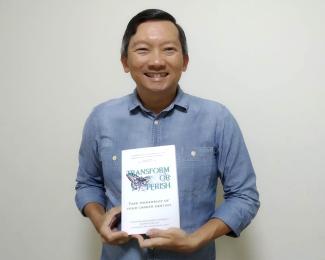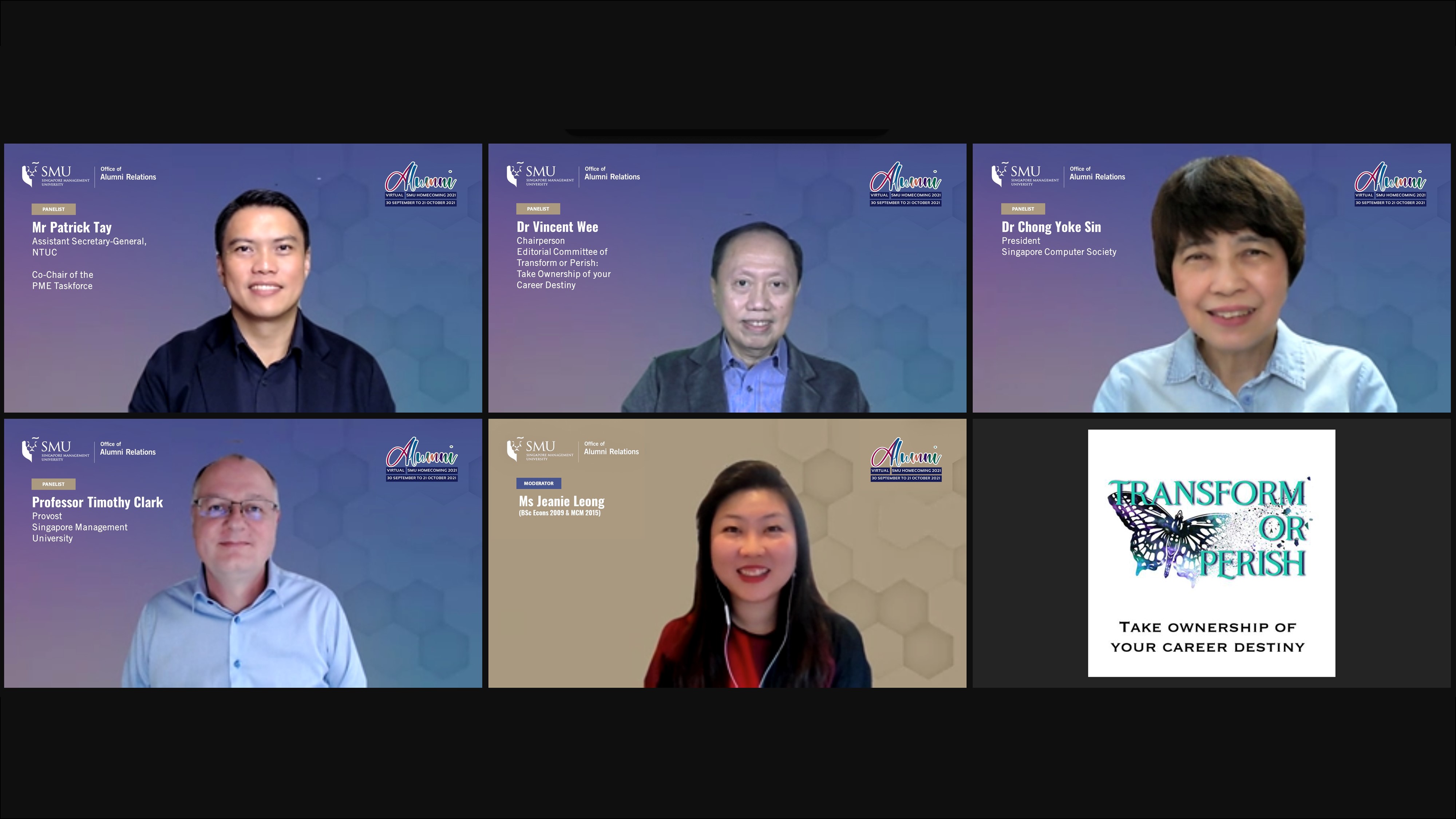
Climate change and global warming, technological advancements and health crises, geopolitical tensions and trade wars – these are major forces shaping and impacting the economy, society and polity. These forces have wrought massive disruption to organisations and individuals, so much so that they have been forced to adapt and transform in order to remain relevant and viable.
In the face of such disruptions and uncertainty, what can the Professionals, Managers, Executives and Technicians (PMETs) in Singapore do to remain employable, especially when economic recovery from the Covid-19 pandemic is still nascent?
Mr Chong Tack Chun, an SMU alumnus (Master of Human Capital Leadership, 2020), decided to start a book project on proven career transformation strategies to help PMETs plan their career transformation journey. Together with a group of SMU alumni and faculty including Prof Gary Pan, Prof Jochen Reb and Dr Paul Lim, they collaborated with more than 60 business leaders and professionals from various industries to put together a repertoire of such strategies as well as a rich collection of good industry practices in the form of stories based on personal experiences.
The outcome of the joint effort was a book Transform or Perish: Take Ownership of Your Career Destiny for PMETs. It was launched on 14 October at a virtual event organised by the Office of Alumni Relations as part of SMU Alumni Homecoming 2021, with support from Dato’ Kho Hui Meng Career Centre.
The event was graced by Mr Patrick Tay, Assistant Secretary-General, National Trade Union Congress and Co-Chair of the PME Taskforce; Professor Timothy Clark, SMU Provost; and Dr Chong Yoke Sin, President, Singapore Computer Society. They represent the public sector and labour union, education and private sectors respectively, which are the ecosystem partners supporting PMET development in Singapore.
At the book launch, Mr Chong Tack Chun, who is the editor of the book, said “We are very concerned whether our PMETs are prepared for jobs in the future economy. We collaborated with business partners and professionals across multiple industries to publish a book for PMETs. Our objective is to be able to provide a useful resource for all PMETs to help themselves. Our book contains a repertoire of proven career transformation strategies. A collection of personal stories by PMETs who were successful in their own transformation, as well as practical exercises for PMETs to develop their roadmap to drive change going forward. If our book is a torch, we would like to shine it onto darkness, so that it can help to illuminate the way forward for everyone.”
Tack Chun believes not only in contributing to the PMET community at large, but also in giving back to SMU. He is sponsoring 50 e-copies of his book to SMU undergraduate and postgraduate students, and will also donate copies of the book to the SMU Libraries for the SMU community.
The launch was followed by a panel discussion on the topic, “Building Career Resilience in the Disruptive Future” which was moderated by SMU alumna Jeanie Leong (BSc Econ 2009 & MCM 2015).
Mr Patrick Tay shared that the pandemic has given rise to a low touch economy around the world whereby businesses have to adapt to strict policies including low-touch interactions, limited gatherings, travel restrictions so as to mitigate health risks. As such, businesses and employees in Singapore will need to navigate the new workplace setting and the transformed nature of work.
He added that employees need to be cognisant of the uneven and uncertain economic outlook, be aware of where the in-demand jobs are, and pick up the in-demand job skills to take on these roles. The pandemic has exacerbated structural unemployment and skills mismatch, so the challenge is to equip employees with the skills needed in the growth sectors to take on these jobs. He encouraged PMETs to have an open mind and a positive spirit to want to learn new things.
On the topic of job security, Dr Chong Yoke Sin opined that it is difficult to have a secure job for a lifetime because of the transformation of industries. She said, “The stance to take is to be your own CEO of your career, you are the arbiter of your job security, we need to take ownership of our jobs. To do that, it is useful to have a mentor and a network of people in the same profession who are facing the same job challenges and able to help one another.”
She added that taking ownership of one’s career and skills development also means being aware of the industry trends and attend training not only for skills that are needed for your current job, but also oncoming skills that might be needed in future.
Professor Timothy Clark commented that having a social and professional network, setting realistic career goals and targets, being aware of your knowledge and skills, being aware that you need to develop those knowledge and skills through continuous learning, and seizing learning opportunities, are ways in which young graduates can prepare themselves to face challenges of a disruptive job market and be resilient.
During the Q&A session, the panel took on a number of questions, including the impact of jobs being offshored and outsourced to lower-cost countries, and how universities can prepare students for the new workplace.
Transform or Perish: Take Ownership of Your Career Destiny is an invaluable resource on career transformation strategies for PMEs to leverage on. The book is available for purchase at https://www.sgbookshelf.com/product-page/transform-or-perish
Proceeds from the book sales will go towards supporting charitable causes such as the Straits Times Pocket Money Fund to help low-income families.

